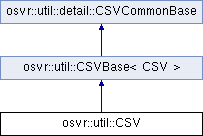The "traditional" CSV class: get all your data set up ahead of time. More...
#include <CSV.h>
Inheritance diagram for osvr::util::CSV:

Public Member Functions | |
| void | output (std::ostream &os) const |
| Outputs all the stored rows and columns, with the union of all headers in the first row, quoted, to the std::ostream given. More... | |
 Public Member Functions inherited from osvr::util::CSVBase< CSV > Public Member Functions inherited from osvr::util::CSVBase< CSV > | |
| RowProxy | row () |
| Main call for the CSV object: returns a proxy object that you can redirect "cells" into, in order to add them to a new row in the CSV table. More... | |
| std::size_t | numDataRows () const |
| Gets the number of rows in the internal data storage. More... | |
| std::size_t | numRows () const |
| Gets the total number of rows that have been streamed/added to this CSV object, whether or not they're in the internal data storage. More... | |
 Public Member Functions inherited from osvr::util::detail::CSVCommonBase Public Member Functions inherited from osvr::util::detail::CSVCommonBase | |
| column_id | getColumn (std::string const &heading) |
| column_id | numColumns () const |
Friends | |
| class | CSVBase< CSV > |
Additional Inherited Members | |
 Public Types inherited from osvr::util::CSVBase< CSV > Public Types inherited from osvr::util::CSVBase< CSV > | |
| using | RowProxy = detail::CSVRowProxy< CSV > |
 Public Types inherited from osvr::util::detail::CSVCommonBase Public Types inherited from osvr::util::detail::CSVCommonBase | |
| using | DataRow = std::vector< std::string > |
| using | column_id = std::size_t |
 Protected Member Functions inherited from osvr::util::CSVBase< CSV > Protected Member Functions inherited from osvr::util::CSVBase< CSV > | |
| void | prepareForRow () |
| Called by CSVRowProxy life cycle, on row creation. | |
| void | dataForLatestRow (std::string const &heading, std::string const &data) |
| Called by CSVRowProxy life cycle, on cell addition. | |
| void | finalizeLatestRow () |
| Called by CSVRowProxy life cycle, on destruction of active row proxy. More... | |
| DataRow & | latestRow () |
| Called internally and potentially by derived classes for access to the "latest row" temporary storage. More... | |
| void | outputRow (std::ostream &os, DataRow const &row) const |
| Called by outputData() and by derived classes to format individual rows. More... | |
| void | outputData (std::ostream &os) const |
| Called by derived classes to output stored data rows. | |
| void | moveLatestRowToData () |
| utility function for use in derived finalizeLatestRow() | |
 Protected Member Functions inherited from osvr::util::detail::CSVCommonBase Protected Member Functions inherited from osvr::util::detail::CSVCommonBase | |
| void | outputHeaders (std::ostream &os) const |
Detailed Description
The "traditional" CSV class: get all your data set up ahead of time.
When you're ready to get your output, hand an ostream (like std::cout or your favorite std::ofstream) to .output()
Member Function Documentation
§ output()
|
inline |
Outputs all the stored rows and columns, with the union of all headers in the first row, quoted, to the std::ostream given.
The documentation for this class was generated from the following file:
- inc/osvr/Util/CSV.h
 1.8.12
1.8.12